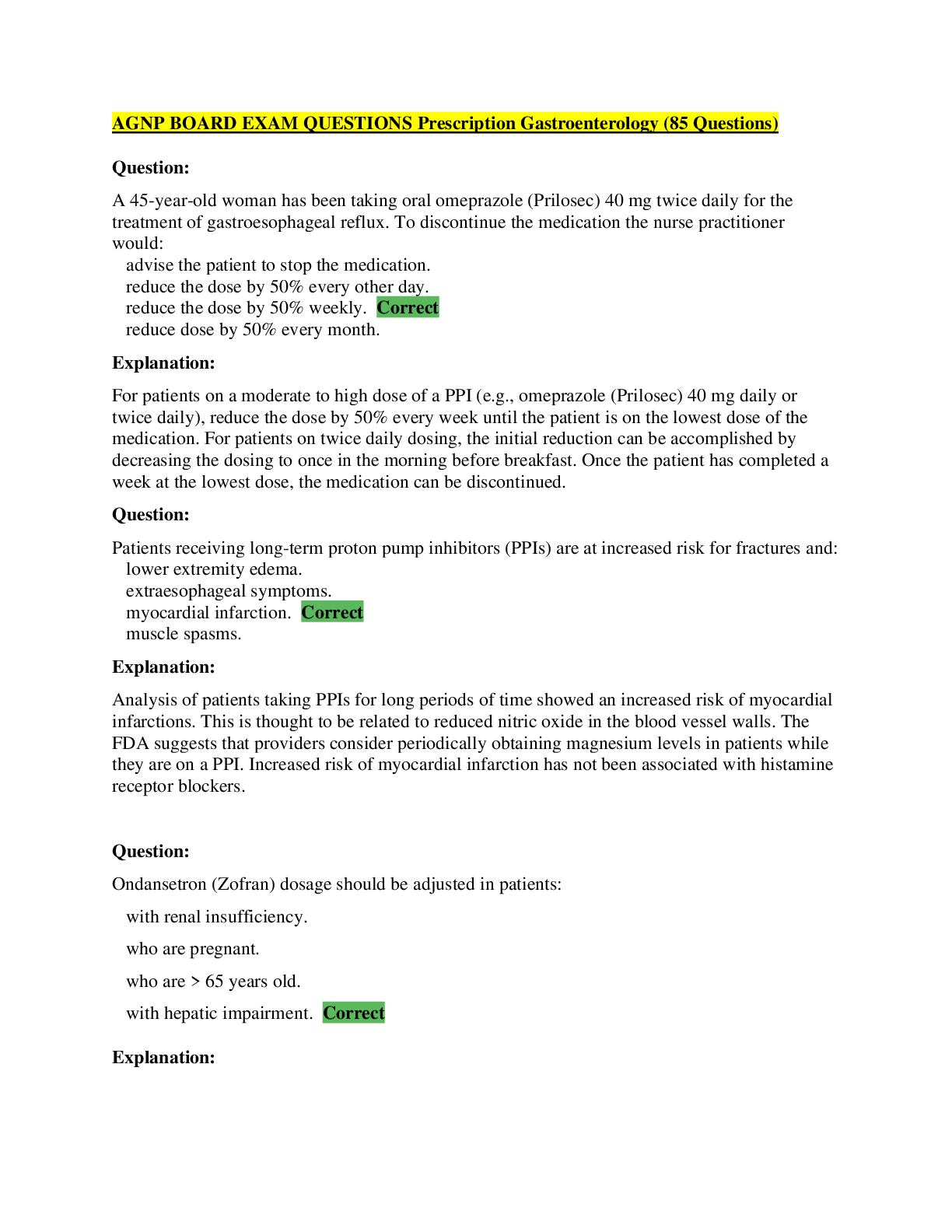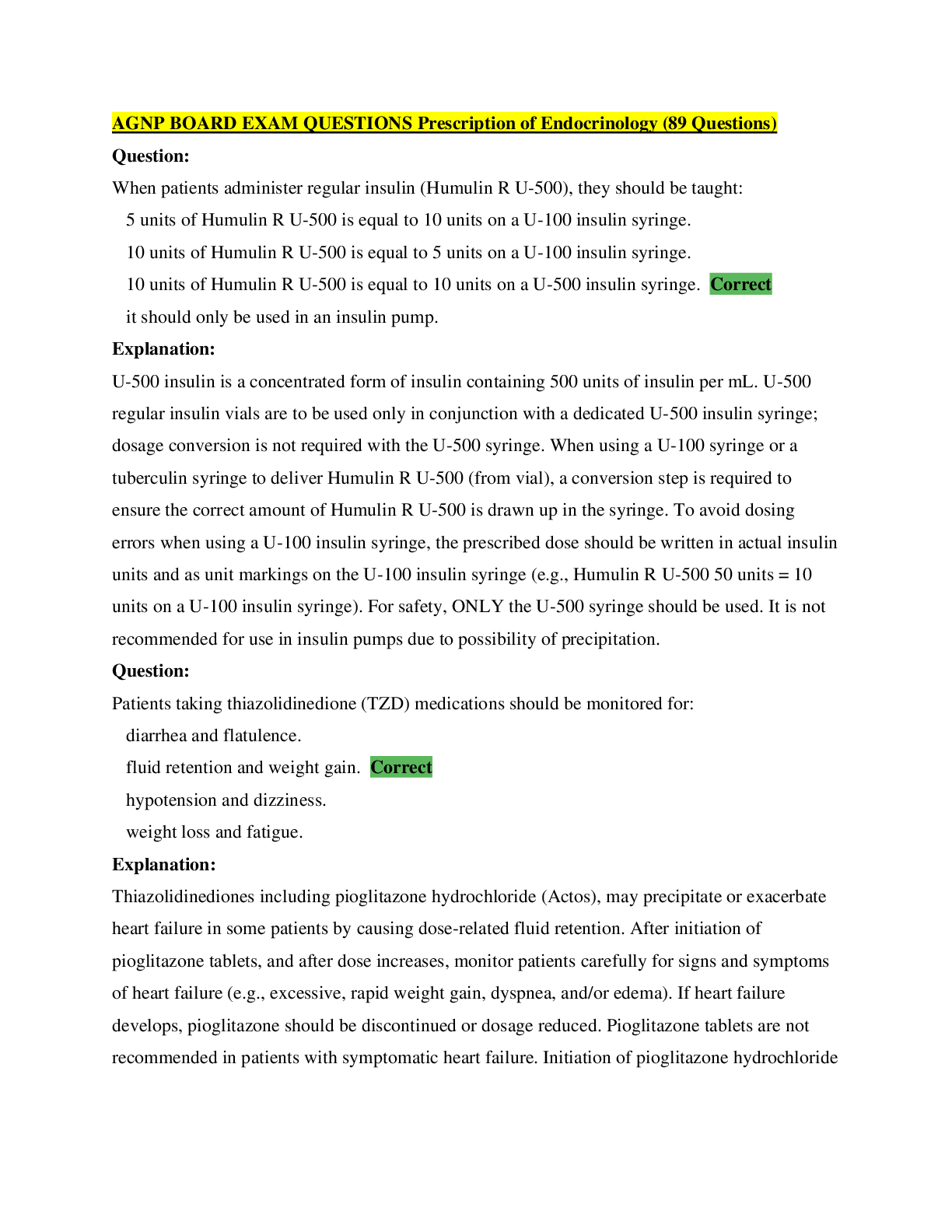*NURSING > EXAM > AGNP BOARD EXAM QUESTIONS Prescription Gastroenterology (85 Questions and Answers) (All)
AGNP BOARD EXAM QUESTIONS Prescription Gastroenterology (85 Questions and Answers)
Document Content and Description Below
AGNP BOARD EXAM QUESTIONS Prescription Gastroenterology (85 Questions and Answers) Question: A 45-year-old woman has been taking oral omeprazole (Prilosec) 40 mg twice daily for the treatment of gas... troesophageal reflux. To discontinue the medication the nurse practitioner would: advise the patient to stop the medication. reduce the dose by 50% every other day. reduce the dose by 50% weekly. Correct reduce dose by 50% every month. Explanation: For patients on a moderate to high dose of a PPI (e.g., omeprazole (Prilosec) 40 mg daily or twice daily), reduce the dose by 50% every week until the patient is on the lowest dose of the medication. For patients on twice daily dosing, the initial reduction can be accomplished by decreasing the dosing to once in the morning before breakfast. Once the patient has completed a week at the lowest dose, the medication can be discontinued. Question: Patients receiving long-term proton pump inhibitors (PPIs) are at increased risk for fractures and: lower extremity edema. extraesophageal symptoms. myocardial infarction. Correct muscle spasms. Explanation: Analysis of patients taking PPIs for long periods of time showed an increased risk of myocardial infarctions. This is thought to be related to reduced nitric oxide in the blood vessel walls. The FDA suggests that providers consider periodically obtaining magnesium levels in patients while they are on a PPI. Increased risk of myocardial infarction has not been associated with histamine receptor blockers. Question: Ondansetron (Zofran) dosage should be adjusted in patients: with renal insufficiency. who are pregnant. who are > 65 years old. with hepatic impairment. Correct Explanation: Ondansetron (Zofran) is a 5-HT3 receptor antagonist used for the treatment of nausea and vomiting. Dose limitations are recommended for patients with severe hepatic impairment (Child-Pugh class C); use with caution in mild-moderate hepatic impairment; clearance is decreased and half-life increased in hepatic impairment. No dosage adjustment is recommended with renal insufficiency, pregnancy or in advanced age. Question: The antiemetic that does NOT have potential to cause QT prolongation is: promethazine (Phenergan). Correct chlorpromazine (Thorazine). ondansetron (Zofran). prochlorperazine (Compazine). Explanation: Antihistamines such as promethazine and diphenhydramine do not cause QT prolongation. Dopamine and serotonin antagonists are both associated with QT prolongation. Chlorpromazine (Thorazine) and prochlorperazine (Compazine) are dopamine antagonists. Ondansetron (Zofran) is a serotonin antagonist. If a patient has suspected QT interval prolongation or is taking other medications with which the QT interval prolongation could be additive, a 12-lead EKG is recommended before treatment is initiated. Question: Promethazine (Phenergan), a 1st generation antihistamine, is contraindicated in the presence of: motion sickness. sedation. asthma. Correct seasonal allergic rhinitis. Explanation: Promethazine (Phenergan) is contraindicated in patients with hypersensitivity reaction to promethazine, other phenothiazines, or any component of the formulation; coma; lower respiratory tract symptoms, including asthma; children younger than 2 years of age; intra-arterial or subcutaneous administration. Question: Oral metoclopramide is contraindicated in the patient diagnosed with: migraines. epilepsy. Correct diabetes. renal impairment. Explanation: Metoclopramide (Reglan) is contraindicated in situations when gastrointestinal (GI) motility may be dangerous, including mechanical GI obstruction, perforation, or hemorrhage; pheochromocytoma; history of seizure disorder (e.g., epilepsy); and concomitant use with other agents likely to increase extrapyramidal reactions. Caution is advised in patients with renal impairment; dosage adjustment may be needed. Question: Hyperosmotic agents and saline laxatives should be avoided or used with caution in patients who have: chronic constipation. liver disease. heart failure. Correct hypothyroidism. Explanation: Hyperosmotic agents and saline laxatives may seriously alter fluid and electrolyte balance. This increases the risk for dehydration and electrolyte disturbances, especially hypokalemia. Therefore, the risks versus the benefits should be considered prior to use in patients with heart failure. Question: Corticosteroids, used in the treatment of ulcerative colitis, usually do NOT: increase the rate of infection. reduce the effectiveness of vaccines. increase the effectiveness of antibiotics. Correct increase the risk of developing osteoporosis. Explanation: Corticosteroids usually do NOT increase the effectiveness of antibiotics; they reduce their effectiveness. Because they suppress the immune system, they increase the rate of infection, reduce the effectiveness of vaccines and increase the risk of osteoporosis and fractures due to loss of calcium with corticosteroids. Question: The plasma elimination half-life of esomeprazole (Nexium) is: 1-1.5 hours. Correct 2-3 hours. 3.5-5 hours. 6-8 hours. Explanation: The plasma elimination half-life of esomeprazole (Nexium) is approximately 1 to 1.5 hours. Less than 1% of the parent drug is excreted in the urine. Approximately 80% of an oral dose of esomeprazole is excreted as inactive metabolites in the urine, and the remainder is found as inactive metabolites in the feces. ..............CONTINUED [Show More]
Last updated: 2 years ago
Preview 1 out of 34 pages

Buy this document to get the full access instantly
Instant Download Access after purchase
Buy NowInstant download
We Accept:

Also available in bundle (1)

AGNP BOARD EXAMS (23 Different Versions) ; Questions and Answers
AGNP BOARD EXAMS (23 Different Versions) ; Questions and Answers
By YourTutor 4 years ago
$95.5
23
Reviews( 0 )
$22.50
Can't find what you want? Try our AI powered Search
Document information
Connected school, study & course
About the document
Uploaded On
Feb 01, 2021
Number of pages
34
Written in
Additional information
This document has been written for:
Uploaded
Feb 01, 2021
Downloads
0
Views
111













 Prescription Gastroenterology (85 Questions) – South University Savannah.png)




 - South University.png)


